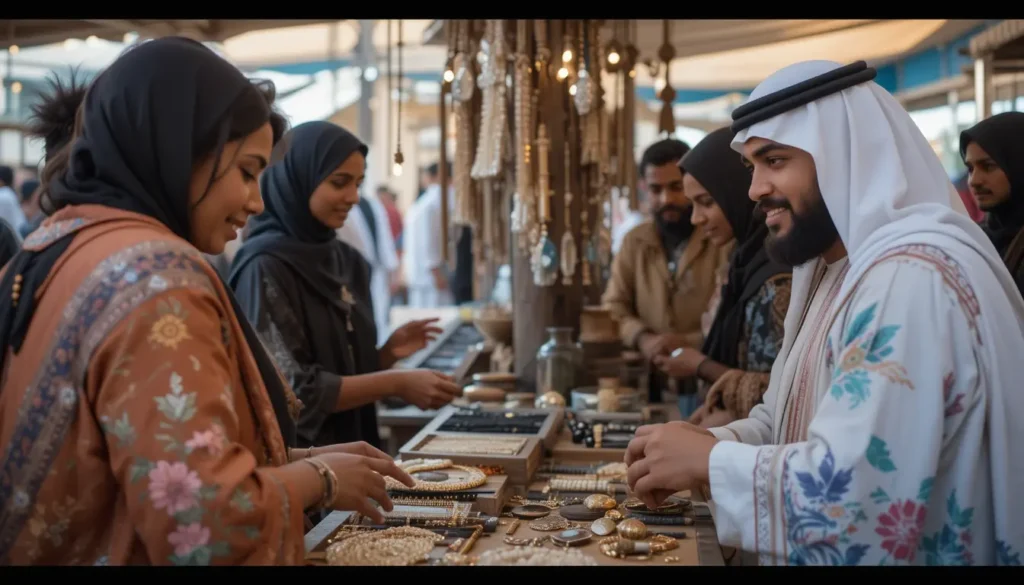A New Wave of Craftsmanship in the UAE
In an age where mass production dominates store shelves, the UAE is witnessing a quiet but powerful revival: the handmade movement. From intricately woven textiles inspired by Bedouin heritage to contemporary jewelry crafted with sustainable materials, handmade goods in the Emirates are more than just products; they are stories, traditions, and identities woven into every stitch, brushstroke, and design.
Why This Matters Now
Handmade is no longer limited to tradition alone; it represents a modern cultural tapestry where authenticity meets innovation. For artisans, it’s an opportunity to build thriving businesses rooted in creativity. For consumers, it’s a chance to connect with meaningful products that embody craftsmanship, sustainability, and heritage.
What You’ll Discover Here
This guide is your gateway to the flourishing world of handmade in the UAE. Whether you’re an aspiring artisan looking for a roadmap to launch your craft, an established creator ready to scale, or a discerning buyer searching for authentic pieces, you’ll find practical strategies, insider insights, and curated recommendations. Most importantly, you’ll gain a deeper appreciation for the dedication, skill, and cultural richness behind every handmade item.
The Heart of Handmade in the UAE: Culture, Craft, and Community
The Resurgence of Artisan Craftsmanship
Across the globe, handmade products are experiencing a powerful renaissance. In a world defined by mass production and fast fashion, people are increasingly seeking authenticity, quality, and connection. Nowhere is this shift more vibrant than in the UAE a country where tradition and modernity seamlessly intertwine.
Craftsmanship has always been at the core of Emirati culture. From the delicate weaving of Al-Sadu textiles to intricate palm frond braiding (Khoos) and fine goldsmithing, artisans have passed down their skills for generations, embedding meaning into every creation. Today, modern Emirati and expatriate artisans are not only preserving these traditions but also reimagining them, infusing contemporary design, sustainable practices, and global influences to create pieces that resonate with today’s market while honoring the past.
This dynamic blend of heritage and innovation positions the UAE as a unique hub for the handmade movement, bridging timeless artistry with modern lifestyles.
Why Handmade Matters in the UAE
1. Uniqueness & Authenticity
Unlike factory-produced items, every handmade creation carries the distinct mark of its maker, be it a subtle variation in texture, a personalized design, or a story tied to cultural identity. For consumers in the UAE, this uniqueness offers more than just a purchase; it’s an investment in authenticity and a connection to something meaningful.
2. Sustainability & Ethical Consumption
Handmade goods often embody slow, sustainable practices. Whether it’s the use of locally sourced materials, eco-friendly production methods, or small-batch processes, handmade aligns with the growing movement toward conscious consumerism. Supporting local artisans also strengthens the UAE’s circular economy, keeping value within the community and reducing reliance on mass imports.
3. Community Building
Beyond the products themselves, handmade fosters connection. Artisan markets, cultural festivals, and creative workshops across the UAE provide spaces where artists and consumers meet, share stories, and celebrate creativity. Every handmade purchase supports not only an individual artisan but also a wider creative ecosystem, helping preserve traditions, encourage innovation, and build a sense of community pride.
For the Aspiring Artisan & Business Owner: Crafting Your Success in the UAE
1. Starting Your Handicraft Business in the UAE
Niche Identification & Market Research
The first step to building a successful handicraft business is finding your niche. In the UAE’s diverse and multicultural market, consumers are drawn to products that balance tradition with modern appeal. This means the most profitable niches often combine personalization, luxury, and cultural storytelling.
For example, personalized handmade gifts are highly sought after in both the local and expatriate communities. Similarly, luxury handmade items such as fine jewelry, bespoke décor, or limited-edition textiles resonate strongly in a country known for its appreciation of exclusivity.
👉 To stay ahead, it’s crucial to study emerging trends and consumer demands
Expert Tip: Look for underserved markets. This could mean offering eco-friendly packaging with your handmade candles, curating Arabic-inspired stationery for weddings, or creating sustainable fashion pieces that align with the UAE’s push toward green initiatives.
Legal & Registration Process
The UAE offers a business-friendly environment, but a proper setup is essential for long-term success. Depending on your goals, you may choose between operating as a freelancer, setting up a mainland business, or establishing a free zone company.
Each option comes with its own requirements for licensing, fees, and scope of activities. For artisans selling at markets, online, or through boutique retailers, a freelancer license can often be the most cost-effective entry point.
E-E-A-T Consideration: Regulations vary depending on emirate and product type, so it’s vital to consult a licensed business setup consultant or legal advisor to ensure compliance. This protects your reputation and allows your business to scale confidently.
For a step-by-step breakdown, explore our full guide: Start a Profitable Handicraft Business in the UAE.
Sourcing Materials & Production
The quality of your materials directly reflects the value of your product. In the UAE, artisans can access a wide range of locally available resources from traditional textiles and palm fronds to regional clay and metals. Leveraging these not only strengthens your product’s authenticity but also appeals to consumers who value cultural heritage.
At the same time, imported specialty materials (e.g., premium yarns, gemstones, or eco-certified woods) can elevate your offerings to luxury status. The key is to balance local authenticity with imported excellence, while prioritizing sustainability and ethical sourcing.
Pro Tip: Many artisans partner with local farms, eco-suppliers, and community cooperatives to ensure their materials are responsibly sourced. This not only enhances your brand’s credibility but also connects you to the UAE’s growing sustainability movement.
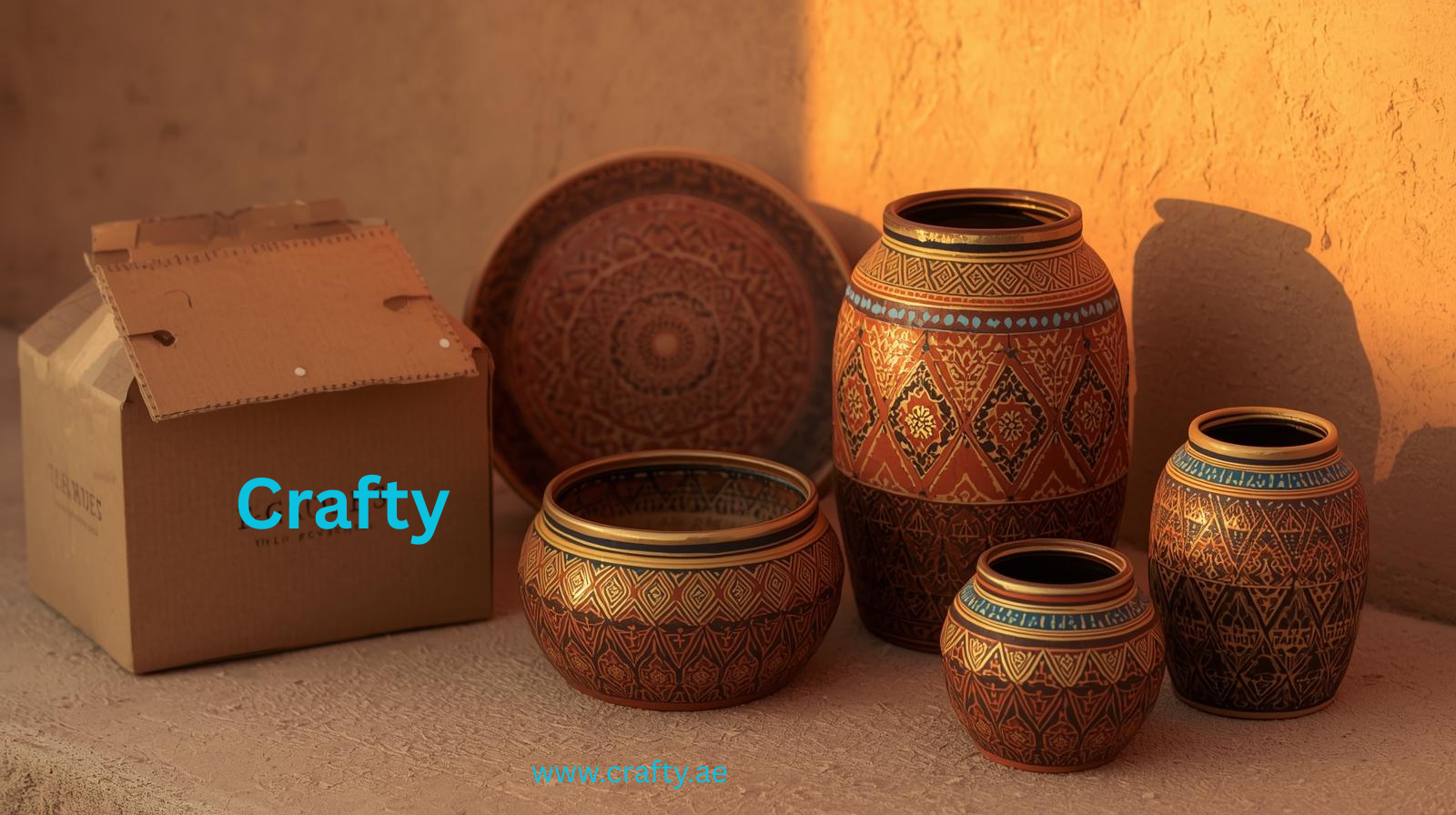
2. Crafting for the UAE Market: Design, Quality, and Climate Considerations
Design & Aesthetic Trends
Success in the UAE’s handmade market often comes down to how well artisans adapt their designs to local cultural preferences while adding a touch of modern appeal. The UAE is home to a diverse population, but certain design themes consistently resonate:
- Islamic geometry and calligraphy – timeless motifs that reflect heritage and spiritual significance.
- Traditional Emirati patterns – inspired by Al-Sadu weaving, palm fronds, and desert motifs.
- Luxury finishes – gold leaf, metallic accents, and high-end materials that match the UAE’s reputation for refinement.
Example: A modern jewelry designer might blend traditional Emirati motifs like the palm tree or falcon with sleek contemporary settings, creating pieces that appeal to both locals and international buyers. This balance of cultural authenticity and modern sophistication is what sets handmade products apart in the UAE marketplace.
Quality Control & Craftsmanship
In a market where reputation is everything, quality is non-negotiable. Consumers in the UAE value durability, attention to detail, and premium finishes. A poorly finished piece not only risks returns but can also damage long-term brand trust.
This is where artisans must demonstrate mastery of their craft. From consistent stitching in handmade textiles to precision polishing in jewelry, small details make a big difference in standing out from competitors.
E-E-A-T Consideration: Artisans who highlight their expertise through certifications, process transparency, or showcasing years of practice build stronger credibility with UAE consumers, who are highly discerning buyers.
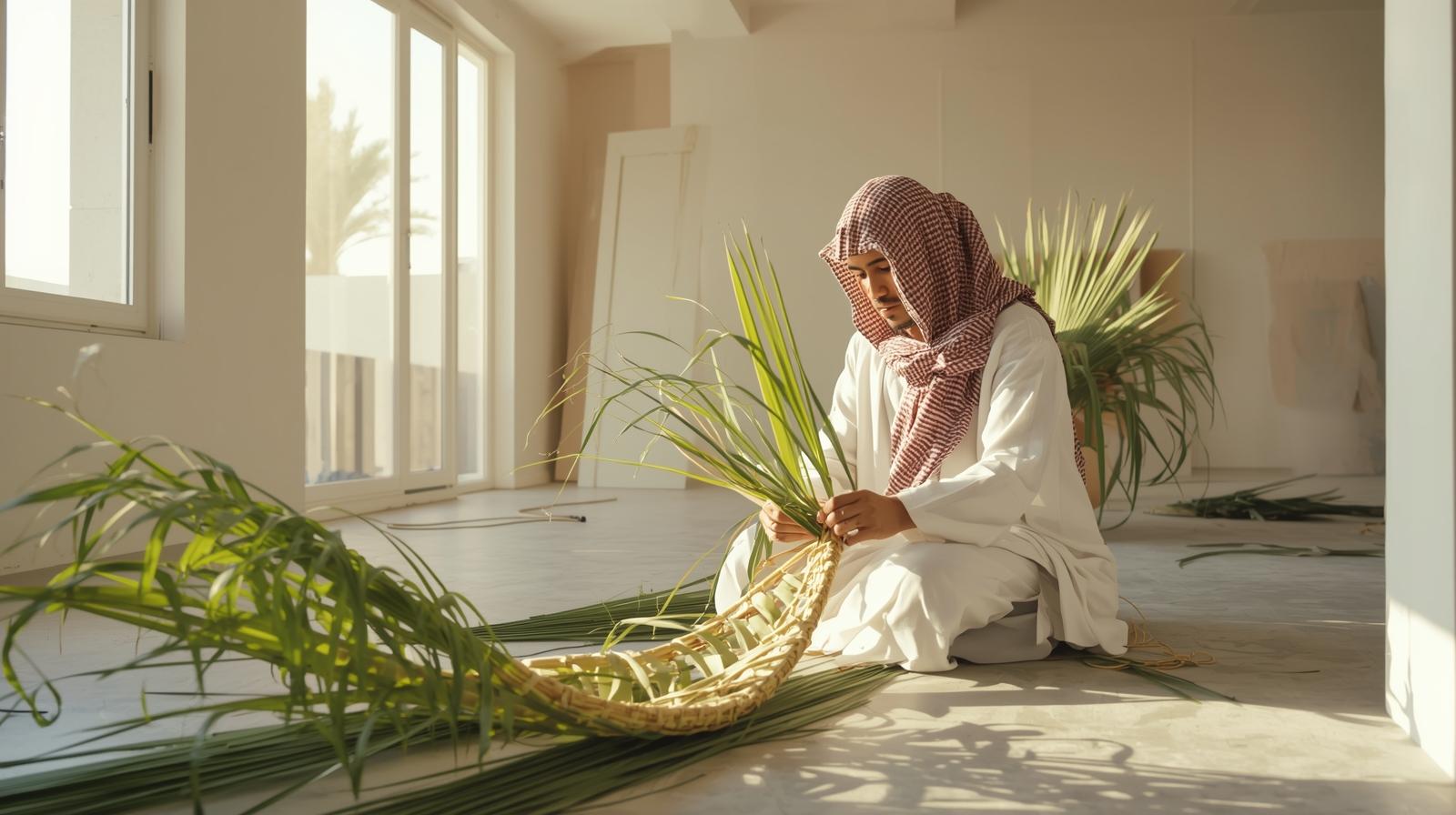
Climate Adaptation for Products
The UAE’s hot and humid climate poses unique challenges for handmade goods. Materials that work well in cooler climates may struggle under desert conditions.
- Textiles may fade or weaken in prolonged sunlight exposure.
- Candles and soaps risk melting or softening in high temperatures.
- Paintings and art pieces may warp if not properly sealed.
For a detailed example, see our guide on Handmade Soaps in the UAE’s Hot & Humid Weather.
Expert Tip: Choose heat-resistant materials and protective packaging. For instance:
- Use beeswax blends in candles to increase melting resistance.
- Store and ship textiles in moisture-absorbing packaging to prevent mildew.
- Apply UV-resistant finishes to artwork to preserve color vibrancy.
Adapting products to the UAE climate not only ensures durability but also demonstrates that your brand understands and respects local realities a powerful trust signal for consumers.
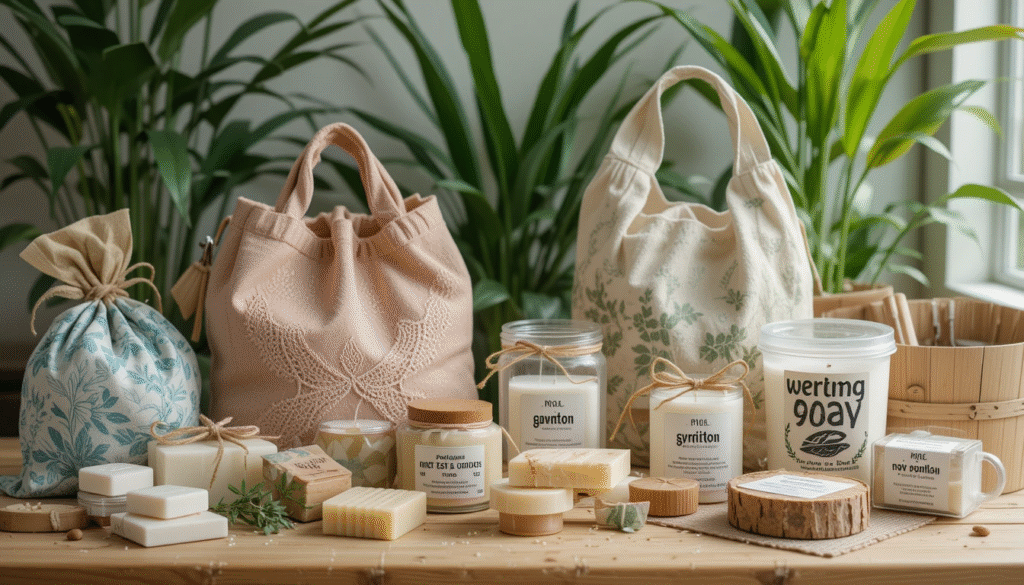
3. Selling Your Handmade Products: Online & Offline Channels
Online Sales Strategies
Selling handmade products online in the UAE opens doors to both local buyers and the global handmade community. The first step is choosing your platform:
- Personal website (Shopify, WordPress, Wix) gives you full control over branding, pricing, and customer experience.
- Marketplaces and social commerce provide ready-made traffic and visibility, but come with fees and platform rules.
Once your shop is set up, pay attention to the practical essentials:
- Payment gateways: UAE-friendly options include PayTabs, Telr, Stripe, and PayPal.
- Shipping & logistics: Consider reliable courier services like Aramex, Fetchr, or DHL. Offering cash-on-delivery (still popular in the UAE) can boost trust, especially with first-time buyers.
For a full breakdown, read our Guide to Selling Products Online in the UAE (2025).
Top UAE Online Marketplaces for Handicrafts (2025)
| Marketplace Name | Primary Focus | Commission/Fees (Approx.) | Target Audience | Ease of Setup | Key Advantage for Artisans |
| Etsy | Handmade & Vintage | ~5% + Listing Fees | Global (Strong UAE presence) | Medium | Global handmade community, niche-focused buyers |
| Noon | General Retail | 5–15%+ | Local (UAE, KSA, Egypt) | Medium | Large local customer base, strong logistics support |
| Amazon AE | General Retail | 7–15%+ | Local (UAE) | Medium | Massive reach, Fulfilled by Amazon (FBA) option |
| The Artisan Market UAE | Local Handmade | Flat Fee/Subscription | Local (UAE) | Low | Community-driven, dedicated to local artisans |
| Instagram/Facebook Shops | Social Commerce | Varies (platform-specific) | Niche/Community buyers | Low | Direct engagement, strong visual marketing tools |
For more details on pros, cons, and seller support, see our Review of Top UAE Online Marketplaces to Sell Handmade Products (2025).
Offline Sales Opportunities
While online sales are growing rapidly, offline channels remain powerful in the UAE, where personal connection and trust play a major role in purchasing decisions.
- Local markets & craft fairs: Events like the Ripe Market and ARTE (Artisans of the Emirates) attract thousands of visitors looking specifically for unique handmade goods.
- Pop-up events: Malls, hotels, and lifestyle spaces often host seasonal pop-ups where artisans can gain visibility.
- Boutique & café collaborations: Partnering with niche retail spaces or upscale cafés provides exposure to targeted, lifestyle-conscious customers.
- Art galleries & cultural hubs: For premium handmade goods (jewelry, textiles, artwork), exhibitions, and gallery partnerships establish credibility and exclusivity.
Recommendation: Even if your main channel is online, participate in community events at least a few times a year. These events build brand recognition, allow customers to experience your work firsthand, and create opportunities to network with fellow artisans and local business owners.
4. Marketing & Branding Your Artisan Goods
- Storytelling & Brand Narrative:
- How to craft a compelling story behind your products and brand.
- Example: Showcasing the artisan’s journey, inspiration, or the cultural significance of their craft.
- Unique Content Element: Suggest incorporating short video interviews with local artisans on their process.
- Digital Marketing for Handmade:
- Social media strategies (Instagram, TikTok for visual appeal).
- Content marketing (blogging about your craft, DIY tutorials).
- Email marketing for customer retention.
- Packaging & Presentation:
- The role of packaging in enhancing perceived value and brand experience.
- Expert Tip: Recommend sustainable and aesthetically pleasing packaging options that reflect the handmade ethos.

5. Scaling for Profitability & Growth
Pricing Strategies
One of the most common challenges artisans face is pricing their work fairly. Unlike mass-produced goods, handmade items require time, skill, and artistry, all of which deserve recognition in the final price.
When calculating prices, consider:
- Cost of materials (local vs. imported, sustainable options).
- Labor & time invested assigning an hourly rate to your work ensures your effort is valued.
- Overheads such as packaging, shipping, marketplace fees, and marketing.
- Profit margin to allow reinvestment and business growth.
E-E-A-T Consideration: Transparent pricing builds trust. Consumers in the UAE are willing to pay premium rates when they understand the craftsmanship, cultural value, and sustainable practices behind each item. Be open about what makes your work special. This honesty strengthens both reputation and customer loyalty.
Expanding Your Product Line
Growth often comes from diversification, but it must align with your brand identity and consumer demand. Introducing new items can help you attract repeat buyers and tap into niche markets.
For example:
- A candle maker might expand into aromatherapy sets or eco-friendly diffusers.
- A textile artisan could offer limited-edition home décor alongside fashion accessories.
- In the UAE, there’s a strong demand for artisan wedding favors and gifts, a niche with high profitability.
Learn more about opportunities here: Artisan Wedding Favors in Dubai & the UAE.
Workshops & Classes
Another powerful way to scale is by sharing your skills. The UAE has a growing appetite for creative workshops, where residents and tourists alike seek hands-on cultural experiences.
Benefits include:
- Diversified income beyond product sales.
- Brand positioning as an expert in your craft.
- Community engagement that creates loyal customers.
Service Recommendation: Prominent venues for hosting or partnering on workshops in Dubai and Abu Dhabi include:
- The JamJar (Dubai) – known for art and craft workshops.
- Tashkeel (Dubai) is a hub for design, craft, and creative training.
- Manarat Al Saadiyat (Abu Dhabi) – a cultural space with frequent art and craft programs.
- Ripe Market events – seasonal opportunities to run mini craft classes for the public.
By offering workshops, artisans not only generate additional revenue but also contribute to the preservation and growth of craftsmanship culture in the UAE.
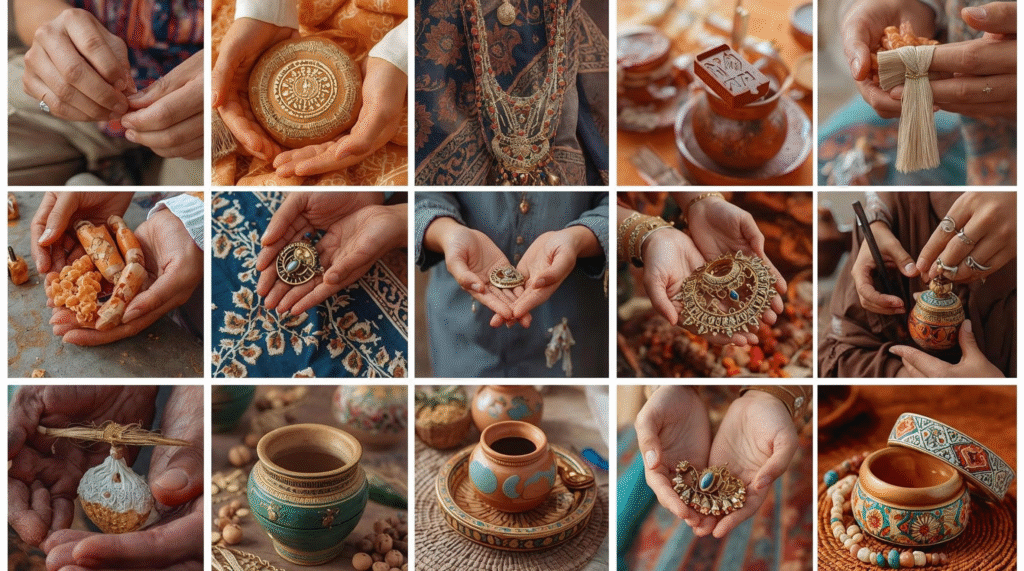
For the Discerning Buyer & Enthusiast: Discovering Authentic Handmade in the UAE
1. Why Choose Handmade in the UAE?
Handmade products are more than objects; they are expressions of culture, creativity, and care. For buyers in the UAE, choosing handmade is a conscious decision that comes with meaningful benefits:
- Supporting Local Artisans & Economy
Every purchase directly sustains an artisan’s livelihood, helping small businesses thrive and keeping cultural traditions alive. In the UAE’s diverse economy, this support strengthens the creative sector and fosters a sustainable ecosystem. - Uniqueness & Personal Touch
Unlike mass-produced items, no two handmade products are exactly the same. Each piece carries a personal touch, whether it’s a subtle variation in texture or a design inspired by heritage. Buyers gain not just a product, but a story to cherish. - Sustainable & Ethical Choices
Many handmade artisans in the UAE prioritize eco-friendly practices: small-batch production, natural materials, and minimal waste. Choosing handmade helps reduce environmental footprint and promotes fair trade values. - Perfect for Gifting
From weddings and anniversaries to corporate events, handmade items are thoughtful gifts that stand out. They show care, meaning, and originality qualities highly valued in the UAE’s gifting culture.
2. Discovering Authentic Handmade Products in the UAE
The UAE’s handmade scene is thriving, offering buyers a diverse range of categories:
- Art & Décor: Paintings, sculptures, ceramics, wall hangings, and statement décor pieces.
- Fashion & Accessories: Custom-tailored clothing, handcrafted jewelry, leather goods, and designer bags.
- Home & Lifestyle: Handmade candles, natural soaps, pottery, woven baskets, and decorative lamps.
- Kids & Play: Educational wooden toys, eco-friendly playsets, and custom-designed children’s accessories.
Where to Find Them:
- Online Marketplaces – Platforms like Etsy, Noon, Amazon AE, and The Artisan Market UAE make it easy to browse from home. (See our earlier marketplace guide for full details.)
- Local Markets, Pop-Ups & Festivals – Popular destinations include the Ripe Market, ARTE (Artisans of the Emirates), and cultural fairs in Sharjah and Abu Dhabi. These events allow buyers to meet artisans directly and experience products firsthand.
- Specialty Boutiques & Galleries – Upscale stores and galleries in Dubai and Abu Dhabi curate high-quality handmade collections, often blending contemporary design with Emirati heritage.
For discerning buyers, discovering handmade in the UAE is not just about shopping, it’s about becoming part of a community that values authenticity, artistry, and cultural preservation.
3. Spotlight on Popular Handmade Categories (with Internal Links)
3. Spotlight on Popular Handmade Categories in the UAE
When it comes to handmade, the UAE offers a treasure trove of products that combine artistry, tradition, and innovation. Below are some of the most sought-after categories, along with guides to help buyers make informed, inspired choices:
Handmade Soaps
Crafted with natural ingredients and tailored to the UAE’s hot, humid climate, handmade soaps not only cleanse but also nourish the skin. Many artisans use regional botanicals and essential oils for unique formulations.
Explore more: Handmade Soaps for the UAE’s Hot & Humid Weather
Artisan Candles
From oud-inspired scents to minimalistic designs, artisan candles bring both ambiance and sophistication to UAE homes. Perfect for gifting or personal indulgence, they add a sensory touch to decor.
Guide: Artisan Candles for UAE Home Décor
Handcrafted Table Lamps
Artisan lamps combine functionality with artistic expression, making them standout pieces in interior design. These lamps often feature materials like ceramics, wood, and glass, handcrafted with care.
Buyer’s Resource: Handcrafted Table Lamps Guide
Authentic Handmade Clothes
From bespoke abayas to hand-stitched accessories, UAE artisans are redefining sustainable fashion. Handmade clothes celebrate individuality while offering quality and ethical alternatives to mass production.
Learn more: Authentic Handmade Clothes in the UAE
Handmade Toys
Safe, durable, and educational, handmade toys are increasingly favored by UAE parents and educators. Crafted from natural materials, they encourage creativity while avoiding mass-produced plastics.
Parent/Educator Guide: Handmade Toys in the UAE
Artisan Wedding Favors
Couples across Dubai and Abu Dhabi are choosing handmade wedding favors that reflect cultural heritage and personal stories. These gifts leave a lasting impression on guests while supporting local talent.
Inspiration: Artisan Wedding Favors in Dubai, UAE
Research Insight: According to a 2024 consumer trends survey by Deloitte Middle East, 68% of UAE consumers say they prefer unique, locally sourced gifts over mass-produced items, especially for weddings, home décor, and personal gifting. This growing shift highlights both the cultural and economic value of supporting artisans.
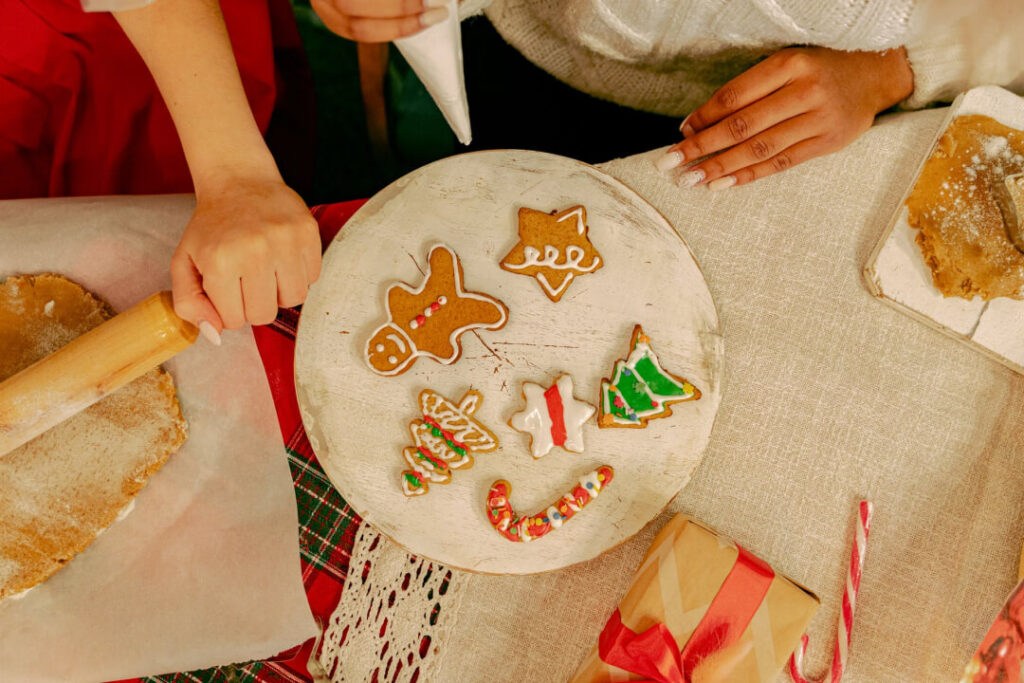
The Future of Handmade in the UAE: Trends & Innovation
The handmade industry in the UAE is at an exciting crossroads, where tradition meets innovation. As consumer preferences evolve and global markets become increasingly interconnected, artisans have remarkable opportunities to reimagine their craft for the future while staying rooted in authenticity.
Technological Integration
Far from replacing artisans, technology is becoming a powerful ally. From 3D printing molds that reduce waste to digital marketing platforms that help craftspeople reach a global audience, innovation is expanding the reach of handmade products. For UAE artisans, embracing e-commerce, social media storytelling, and even augmented reality (AR) product previews can elevate visibility and consumer trust.
Sustainability & Ethical Production
Today’s buyers are more conscious than ever. In the UAE, where sustainability is a growing priority, handmade products stand out as eco-friendly alternatives to mass production. Eco-conscious sourcing, recyclable packaging, and fair-trade practices will increasingly define successful handmade brands. Artisans who transparently share their sustainable practices will earn stronger loyalty from mindful buyers.
Personalization & Customization
The future of handmade lies in uniquely tailored experiences. Whether it’s a hand-painted abaya, monogrammed leather accessories, or a custom fragrance blend, UAE consumers are seeking items that reflect their individuality. Artisans who offer flexible customization options will tap into this rising demand for bespoke luxury.
Cross-Cultural Collaboration
As a global hub, the UAE is perfectly positioned to foster creative partnerships between local artisans and international designers. Such collaborations can give rise to innovative products that celebrate both Emirati tradition and global craftsmanship, expanding the cultural footprint of handmade goods.
For deeper insights into upcoming trends, explore our detailed guide on the Future of Handcrafted Gifts.
FAQ
Is it profitable to start a handicraft business in the UAE?
Yes, with the right niche, quality products, and effective marketing, a handicraft business can be very profitable in the UAE, especially given the growing appreciation for unique, locally-made items. Success hinges on market research, legal compliance, and strategic sales channels.
What are the most popular types of handmade products to buy in the UAE?
Popular handmade products in the UAE include artisan candles, unique soaps, bespoke home decor items (like lamps and ceramics), custom clothing, handcrafted jewelry, and personalized gifts for various occasions, including wedding favors.
How can I ensure the handmade products I buy in the UAE are authentic?
Look for certifications, read product descriptions carefully for details on materials and crafting process, check seller reviews, and ideally, buy directly from artisans at local markets or reputable online platforms dedicated to handmade goods. Authentic items often come with a story about the maker.
Are there specific challenges for handmade businesses due to the UAE's hot climate?
Yes, the hot and humid climate can affect certain handmade products like soaps (leading to ‘sweating’), candles (melting/deforming), and certain textiles. Artisans must consider material choices, specialized packaging, and controlled storage environments to mitigate these effects.
What support is available for small handicraft businesses in the UAE?
The UAE government and various private entities offer support through business incubators, free zones with tailored packages for startups, workshops, and opportunities to participate in local markets and trade shows. Online communities also provide peer support and networking.
Conclusion
Handmade in the UAE is more than a market; it’s a movement. For artisans, it offers a pathway to entrepreneurial success, built on creativity, cultural heritage, and innovation. For buyers, it delivers authentic, meaningful, and sustainable alternatives to mass-produced goods, enriching homes and lifestyles with items that carry a personal story.
The true allure of handmade lies in its ability to blend tradition with modern aspirations. Imagine the “after” state:
As an artisan, you’re running a thriving business that not only sustains you financially but also connects you with a community that values your craft.
As a buyer, you’re surrounded by unique treasures, each piece a conversation starter, a memory keeper, and a reflection of your individuality.
For Artisans: Start planning your handicraft venture today and take your first step toward building a profitable, passion-driven business.
For Buyers: Explore the incredible world of handmade in the UAE and discover your next treasured item that’s crafted with care and meaning.
As we look to the future, one truth remains timeless: craftsmanship will always have a place in the heart of the UAE. With its rich traditions and forward-looking spirit, the country is poised to become a beacon for artisans and admirers of handmade alike. The legacy of craftsmanship is not only enduring it’s evolving, and you have the chance to be part of it.
